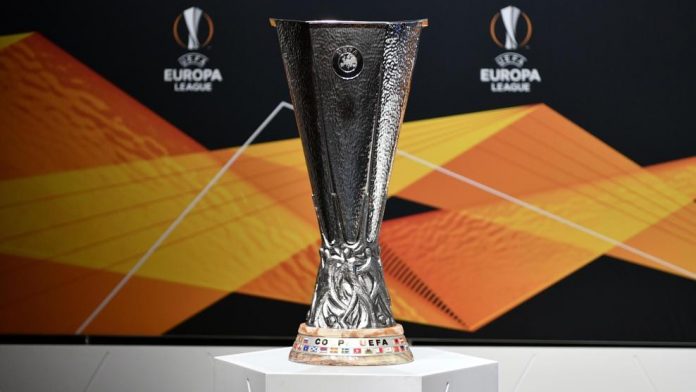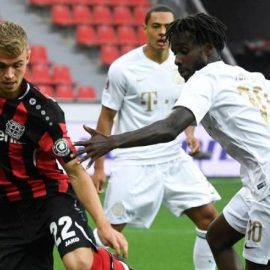– How come nobody ever heard of you? I mean, how come you ain’t got a reputation? (Support Your Local Sheriff!, 1969)
With the visibly terrified Shakhtar Donetsk midfielder Jadson looking like he’d just been told that one of the small plastic spheres in his hand contained a hilarious paper snake on a spring – and a grinning Uwe Seeler looking like the man who’d put it there – August’s draw for the group stages of this season’s UEFA Europa League had the potential to be highly entertaining.
Of course, that was before UEFA pulled out all the stops to make the event as unnecessarily convoluted as the competition itself. The besuited club delegates massed in Monaco soon slumped helplessly in their chairs in the face of an apparently never-ending barrage of balls, pots, more balls and pointless interruptions. Which was a shame, as they missed something interesting.
The splendid moniker of Sheriff Tiraspol (club crest – you guessed it – a sheriff’s badge), champions of Moldova and the forty-second team drawn, failed to elicit any response from the slumbering gathering. It feels safe to assume that the dreams of the recumbent representatives of Steaua Bucharest, Fenerbahçe and FC Twente, their forthcoming opponents in Group H, were taking place somewhere other than Tiraspol.
Yet on the face of it, Sheriff’s obscurity seems undeserved. The club have dominated the Moldovan football scene for the best part of a decade, winning the last nine league titles and five domestic doubles along the way. Sheriff reached the second qualifying round of the UEFA Champions League every year until 2009 – when they lost in the final preliminary stage to Olympiacos. A total of $200 million has been spent on turning the gleaming Sheriff Stadium in what passes for downtown Tiraspol into one of the best football venues anywhere in eastern Europe, with former Austria coach Hans Krankl going so far as to describe it as better than anything available in his own country.
– This is crazy, I don’t even have any guns. (High Noon, 1952)
Still, one has to wonder whether Sheriff are really ready for sustained European competition. Their domestic dominance represents a hollow achievement – put simply, Moldovan football has never been up to much. The country’s league is at present ranked 36th in Europe, and besides Sheriff, none of the other eleven teams in the Divizia Naţională appear in the top 175 European sides.
Proper competitive experience is therefore at a premium for Sheriff. The situation is exacerbated by the fact that, with the exception of goalkeeper Alexandru Melenciuc and captain Vazha Tarkhnishvili – now in his 11th season with the club – the squad has an average age of only 22. The causes of this are twofold – firstly, pressure on Belarusian coach Leonid Kutchuk from within the club to fast-track the products of an expensively-established youth academy; and secondly, a slightly bizarre fixation on importing nascent African and South American talent.
Considering that the last decade has seen Moldova’s relative emigration rates amongst the highest in the world – and with remittances from expatriates accounting for a remarkable 38% of the country’s GDP – Sheriff’s import policy appears even more incongruous. Three Brazilians, an Argentine, a Togolese, a Senegalese and two midfielders from Burkina Faso started the 2009/10 season for Sheriff – remarkably, this actually represents a slight decline since the heady days of 2007/08, when half the Burkinabè national team seemed to be based in Tiraspol and the 25-strong squad featured a grand total of seven Moldovans.
As a result, Kutchuk has committed his youthful team to an energetic, often gung-ho brand of attacking football. Whilst this system works perfectly well in league games against severely limited opposition, the expectation remains that Sheriff will get caught out by European competition.
They got away with it in their 0-0 Europa League opener away against Steaua in September – although nobody saw them do it. The Steaua Stadium was deserted due to a UEFA ban following public disorder (and the display of a nationalist banner so tasteless that Romanian national daily Adevarul was later moved to publish an apology – in Hungarian – on the front page) in the previous round against Ùjpest FC – and the governing body probably did everyone a favour.
In a game of near-transcendent wretchedness, Sheriff’s inability to string more than three passes together before hitting wayward balls forward meant that they conceded 60% of possession to the home side, who themselves completely wasted it through some truly terrible finishing. Even if the team kept their shape well enough and did their best to set a high tempo in midfield, it was this total lack of patience which would have left any hypothetical spectators with a marked impression of acute inexperience.
Kutchuk changed little for the subsequent home game against Fenerbahçe. And whilst some enthusiastic harrying and pressing from the Sheriff midfield was superficially effective against a significantly older side lacking in both pace and width, it soon became obvious that they had little idea of what to do with the ball once they had it. Although things brightened up marginally towards the end of the game with a couple of shots on target, Sheriff’s attacking threat was almost entirely restricted to hopeful punts from over 30 yards out.
Still, European competition is European competition – especially for a side from Moldova. So naturally, the question arises of how Sheriff have advanced so far beyond those around them. The simple answer is that – off the pitch at least – Sheriff are special. Very special.
– You could make a fortune. Hundreds of thousands of dollars. Hey, more than that – thousands of thousands. – They call them millions. (Once Upon a Time in the West, 1967)
Nothing in the story of Sheriff Tiraspol is what it seems. For starters, they are not even from Moldova. Tiraspol is the Soviet time-capsule capital of Transnistria, an almost universally-unrecognised separatist entity east of the Dniester River which, until 1991, split Moldova down the middle. Transnistria declared independence from its neighbour following the collapse of the Soviet Union, proceeded to fight a brief but bloody war, and has been occupied ever since by Russian troops ostensibly operating under a peacekeeping mandate. The absence of international recognition has placed considerable strain on the economy, with the result that a European Parliament delegation to the region in 2002 described Transnistria as ”a black hole in which illegal trade in arms, the trafficking in human beings and the laundering of criminal finance was carried on”. In 2007, the same body was moved to criticise ”the lack of respect for human rights and human dignity in Transnistria”.
Although subsequent studies have disputed some of these conclusions, nobody can doubt the fact that, as the rise of the oligarchs across the former USSR demonstrated all too well, the social and economic upheaval of the early 1990s created unprecendented – if strictly limited – opportunities for personal enrichment. Two ex-KGB officers in Tiraspol by the names of Viktor Gushan and Ilya Kazmaly know this all too well.
Founders of the Sheriff corporation in 1993, the pair skilfully negotiated the treacherous landscape of post-independence Moldova – and post-secessionist Transnistria – to build a huge conglomerate which today employs over 5,000 people across industries as diverse as oil, foodstuffs, household goods, banking, television, supermarkets and construction. Nobody sneezes in Transnistria without Sheriff selling them a tissue.
The rise of Sheriff followed a familiar oligarchical pattern – whether by nature or design, state-owned industries were brought to the brink of bankruptcy before being turned over to the private sector for a minimal consideration. In the end, everything was owned by a few, and the isolationist policies of the Transnistrian government, which provided an ideal framework for the creation of near-absolute monopolies, played a further enabling role.
All this is obviously as much a political as an economic process, and the connections between Sheriff and the Skoda-driving president of Transnistria, Igor Smirnov – who has promised not to leave office until his government is officially recognised – unquestionably run deep. Uniquely amongst Transnistrian companies, the corporation is permitted to conduct business in hard currency. Sheriff is also excused from paying import or export taxes – with the national body for collecting such duties headed by none other than Smirnov’s son Vladimir.
– Tell me, isn’t the sheriff supposed to be courageous, loyal and, above all, honest? (For a Few Dollars More, 1965)
Just how deep the links run, though, is impossible to say. Neither the company acts nor the ownership structure of Sheriff have ever been revealed – the company is registered outside Transnistria – giving rise to long-held suspicions that there are elements of the corporation’s business that some people would rather remain undisclosed. As for the ultimate owners of Sheriff, most analyses inevitably converge on a single individual – Igor Smirnov himself.
Despite some recent public friction between the president and the company, which he accused of plotting a coup d’état and heretically seeking reunification with Moldova following a brief dalliance with the opposition Renewal party, it is generally accepted that behind the scenes a very profitable relationship between nationalism and corporatism remains intact. In summary, the Sheriff corporation essentially appears to be a parallel state, with certain elements of the deep state structure elsewhere claimed in connection with modern Turkey.
This, then, is what lies behind the success of Sheriff Tiraspol. But what are they doing with a football team? Several possibilities suggest themselves. Firstly, the internationalism of the club’s transfer policy, as noted above, is particularly striking. For a country almost entirely lacking in international recognition, the biggest side in Transnistria certainly places great faith in the global transfer market. And whilst economic motives are certainly in play, Sheriff have yet to make a substantial profit from the transfer of any of their African or Brazilian imports, although several players have escaped the gravitational pull of the black hole and gone on to relative success elsewhere, notably Nigerians Isaac Okoronkwo at FC Moscow and Chidi Odiah at CSKA Moscow; and FC Metz striker Razak Omotoyossi.
A more interesting interpretation is as follows – the internationalism is a way to demonstrate global linkages in the absence of more formal relations. Just as the diplomatic ambiguity of Taiwan has forced the island to conduct international relations at a civic, rather than a national, level – Taipei currently has 48 sister cities around the world – so perhaps Transnistria is attempting something similar with Sheriff Tiraspol.
Certainly some of the public pronouncements relating to the side do little to dispel this theory. The government mouthpiece (and dedicated trasher-of-all-things-Moldovan) Tiraspol Times has consistently moralised on the global dimension of Sheriff’s transfers – one article on the arrival of two of the team’s Brazilians explained that: ”As Tiraspol’s top football team has already shown, international integration is easy to achieve when everyone shares the same goal”; before going on to quote Kutchuk as saying: ”Once all the players are working together to win, then language barriers or ethnic differences won’t present any obstacles”.
However, the ultimate objective of Sheriff Tiraspol is probably much simpler. Football has always had an unmatched power to dispense legitimacy. The causes of this, which have yet to be studied in any detail, are complex and numerous. But perhaps one of the simplest is the deep-rooted association – which, in truth, it has long since ceased to deserve – between football and innocence, the game as a source of simple pleasure. The effect is one of reflected purity. Anybody responsible for something so wonderful, so the theory goes, can’t be all that bad – even if everything else tells us otherwise.
The difficulty in shaking such ingrained habits of thought is what gives football such political power. And those in power have long understood this. Just as Franco’s foreign minister Fernando Maria Castiella could conclude that: ”Real Madrid are the best embassy we’ve ever had”; so from Kyiv to Grozny, from Kaunas to West London, and finally to the black hole of Europe, football has been embraced as the ultimate path to respectability.
Meanwhile, back on the Riviera, everyone is fast asleep.
Sponsor
Click here for football betting.
Add Sportslens to your Google News Feed!






